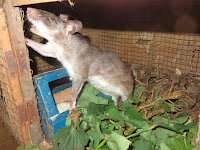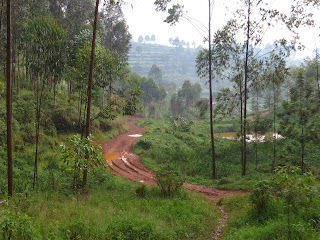The major problems facing the
people of the DR Congo are poverty, conflict, transportation, communication and
hunger.
During my evaluation of the
local agricultural industry and higher education system in Butembo, Democratic
Republic of the Congo (DRC), I have come to realize that agricultural
advancements developed or imported by local universities rarely impact the
local community. Occasionally aid organizations like the Bill and Melinda Gates
Foundation will fund projects to improve the varieties of crops produced in remote
regions of the DRC but rarely do farmers nearest to the universities in Butembo
benefit.
The reason these
innovations don’t take off like wildfire is simple economics-
it costs a farmer fifty cents to purchase a
disease resistant banana sucker from the local university, and $45 to drive
deep into the country by motorcycle taxi, to retrieve cassava cuttings from the
NGO that are new disease resistant varieties.
Virtually no one here can afford this!
The DRC’s GDP is the lowest in the world at
$250, PER YEAR.
The limited access to improved
varieties is an added travesty to the problems in DRC. While the Congolese people struggle to
provide just the basic nutritional requirements to survive, disease and pests
eat away at their harvests. The farmers can’t afford to buy quality inputs so
they don’t produce efficiently, because they don’t produce efficiently they
can’t afford quality inputs- it’s a cyclic poverty trap!!!!
Butembo is in need of a propagation farm to
generate affordable disease resistant varieties. Unlike the very remote regions
of the DRC, Butembo is an agricultural trading hub and would be an ideal
location to disseminate new varieties though the people who are visiting the
city.
I work with agronomists that have technical
knowledge gained from the local universities to run a propagation/demonstration
farm and can provide minimal financial capital necessary to get the operation off
the ground. All I needed was a location
to start working.
One day while on a walk with a priest
we took a shortcut through the local convent. I was amazed to see that the nuns
had roughly two hectors of farm land that was incorporated into their walled-in
compound. I spoke with the mother superior of the convent about using this location
to run a propagation farm; however she was very reluctant to provide me with
any space to grow crops.
She protested my plan, “Look over there,
we are already growing cassava. We don’t need anymore!” I was ready, “Yes, you do have cassava; but
look at the leaves, they’re wilted. Your cassava is sick and probably doesn’t
yield much. I will provide you with cassava plants that won’t get sick and that
will yield much more!”
I should not have believed for a
second that I was smarter than a nun. She responded, “You might be right about
the disease, but if we grow more cassava- we also need to use the land to grow beans.
No one wants to eat just cassava every day. We need beans for protein.”
This was an excellent argument that
used marginal utility to prove a point- It doesn’t matter how much starch is in
your diet; if you don’t have protein you’re still going to starve.
“You’re completely right”, I said. “How about
this, I will work with you in the field, I will pay the community to assist us
in preparing the field, I will pay you upfront for your work in beans AND you
can keep everything that is produced. BUT, the nuns must teach the high school students
everything the agronomists teach them.”
She smiled and said, “thank you for
paying US to work in OUR field. We have a deal!” The entire time we were negotiating,
I thought she didn’t want to have anything to do with the project; but as soon
as we agreed, she was thrilled by the idea. She knew exactly what she was doing;
she played me like a fiddle. I have no
regrets, it’s only $30 dollars and it’s going to a great cause.
The next day I was shocked to see
that nearly half the field had already been cleared by the nuns. The following
day I arrived early to work on clearing the rest of the field, but the nuns
were nearly finished! I asked if they had an extra hoe I could use. Instead one
of the nuns handed me hers. I eagerly reached for the hoe and began imitating the
movement I had seen. I was determined to impress the nuns. “No, no, no, not
like that!” she said.
The nuns laughed and laughed at my
inability to use the hoe. The nun was not even five feet tall but she insisted
on using the hoe with me. The Congolese agronomists I brought with me laughed
and took photos with their cell phones of the short nun and I awkwardly using
the hoe simultaneously. After just a few seconds she thanked me for my work and
told me I could leave- I was not worth the effort of even trying to train!
The cassava cuttings and a disease
resistant variety of potatoes have been collected. I still need to source the
materials for the small green house but we will begin planting on Monday!
My goals for the project
1)
To produce a small but very fertile harvest so
that the local community will notice improved value and subsequently a demand
will be generated for disease resistant varieties
2)
Train the nuns how to propagate the disease
resistant varieties so that they can sell or give them away
3)
Provide visiting priests access to the cuttings
and suckers to take back to their communities to distribute and propagate
4)
Teach high school students innovative
agricultural practices that they can introduce to their families
5)
Reduce the cost of new varieties by improving
access (I was told one cassava plant can be used to create at least 30
cuttings)
6)
Utilize local agronomists to monitor and
evaluate the new disease resistant plantings, and to keep the plantings healthy
by evaluating and suggesting treatments, referring difficult problems to the university
researchers
7)
University researchers can continue to test, analyze
and suggest treatment. By including
researchers at all stages, working directly with the community on client
oriented plant introduction and propagation plots, they gain direct insight into
the farmers’ needs and challenges.
It’s my hope this small
project will demonstrate and propagate improved disease resistant varieties of
cassava- introduced and taught by the nuns, supported through research and
skills from local agronomists and universities, and will lead to lasting
positive impacts on the community of Butembo, and the surrounding area.













































